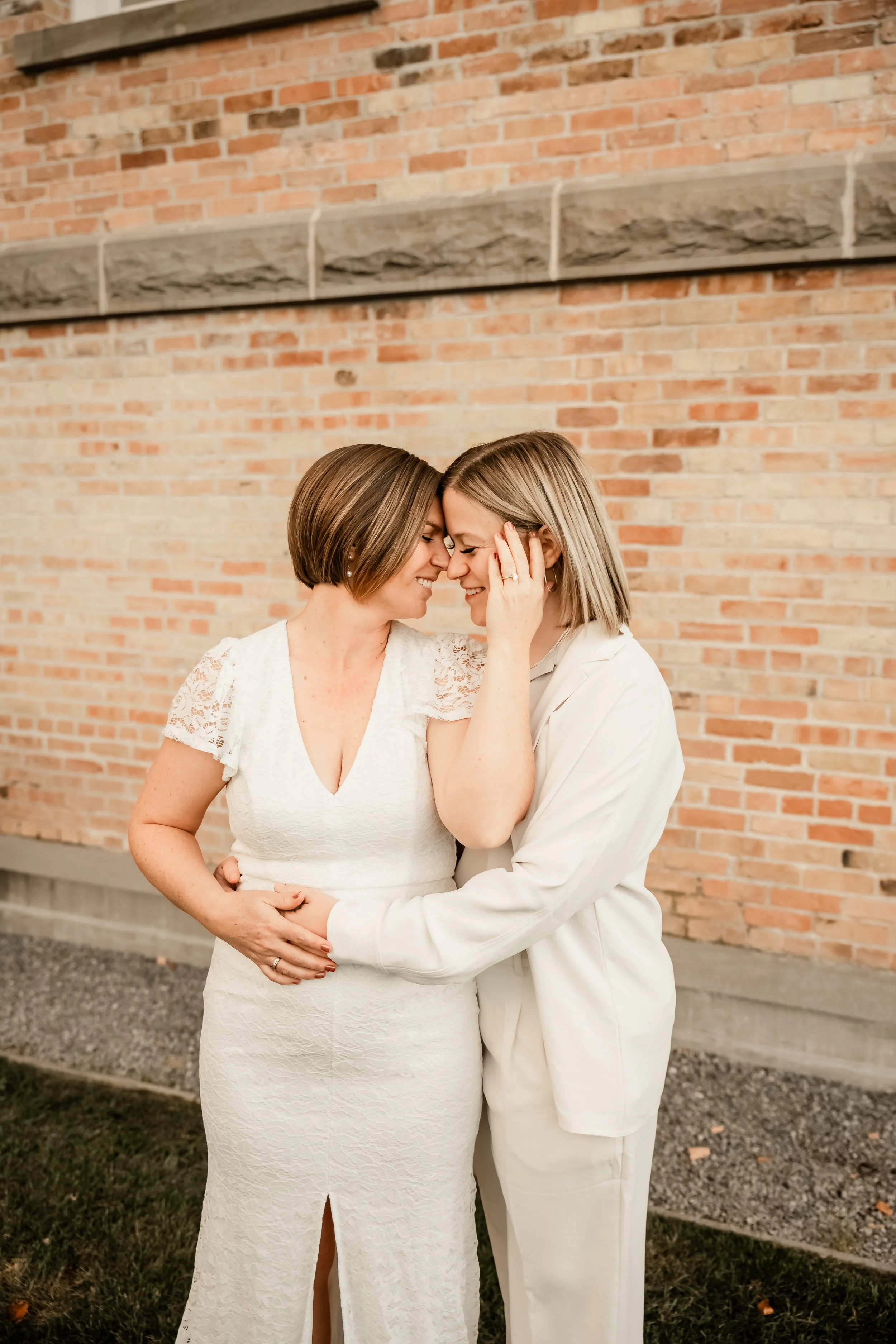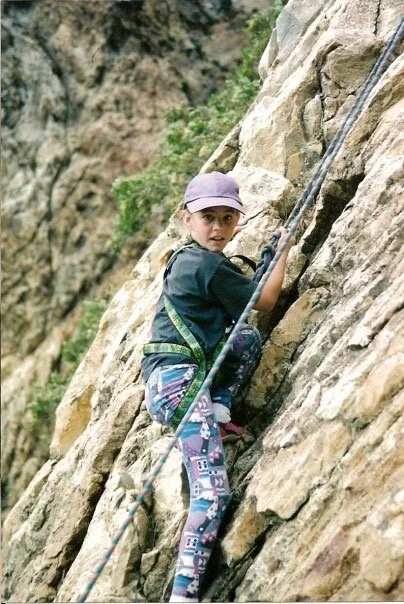This is the story of two “Mormon” girls who were raised in “typical Mormon families.” Rachel was born the youngest of five kids and church was a constant growing up, no matter where they lived. After residing in Texas, Virginia, and Hong Kong, her family moved to Provo when Rachel was in the tenth grade. Upon finishing high school, she attended the University of Utah where she earned a communications degree, excited about the prospect of working in marketing and advertising. She got married during her junior year of college to a man. Feeling pretty clear that the gospel checklist was her road to happiness, Rachel “pursued the path she was supposed to without questioning,” and now says her mind never let her think anything else was an option.
Rachel now reflects on how many of her experiences as a youth and adult would clearly be considered “SSA,” but as her thoughts continued, she continued to push them off as distractions from the path, or temptations happening to her and not authentic feelings within her. Rachel stayed busy with her career, often working a “ton of hours” while pursuing building a family. When her son came along, the reality of her feelings towards women became even more apparent. In her late 20s, as she began to listen to podcasts and others’ stories of navigating a similar road, Rachel says her sense of denial minimized and she could make more sense of her reality. At first, she rationalized she was bi and could continue to make her marriage work, keeping her family intact. She didn’t have plans to share this part of her with anyone but the tension of the secret she’d been keeping for a long time felt very big, too big—and her husband was the first person she pulled in to share what she was realizing. “He was thankfully receptive and helpful, kind, and gentle through the process,” she says.
As time, went on Rachel continued to wade her way out of denial, accepting that she was gay. With this understanding, she evaluated what her path would look like. She realized growth for herself, her husband, and her son was going to be severely limited and that trying to stick it out would progressively lead to an unhealthy family life for all involved. She came to the devastating realization that was not the life she wanted for herself nor those around her.
Michelle grew up in Provo, UT as the oldest of four kids. From a young age, church felt very important to her. “I took church and the gospel very seriously and had a core testimony that Heavenly Father was real, really knew me, and loved me no matter what.” Michelle went to as many as EFYs as she could, served on the seminary council, dated a lot of boys in high school, and then went to college where she fell in love with a roommate—a girl. While the crush was not reciprocated, Michelle said her feelings felt like an explosion, her past feelings for boys paling in comparison. “I felt I had been colorblind, and then put on those special glasses and could finally see the color that everyone else could see.”
Michelle also felt very confused, working overtime to process, as she’d been taught that these kinds of feelings were wrong. Yet she says her feelings for the girl felt wholesome, right and good. Contemplating her life vision to have a temple marriage and eternal family, Michelle decided to push those feelings aside and likewise pursue the prescribed path. She went on a mission to Nicaragua and came home with a goal to date and get married in the temple. That she did, meeting a man with whom she got along well, who made a lot of sense, and who wanted to marry her. Her feelings for him were nothing like the feelings she had had for her roommate, but she rationalized that there were more important things in marriage. After marrying, they quickly had four kids in five and a half years, keeping Michelle so busy she could distract herself from “the romantic and emotional lack she felt in her marriage, that had been there from the start.”
“I trudged forward with faith, trusting it would be fine. I filled my life with the next best thing—hobbies, service, staying active in the church, being the best mom I could be. It was exhausting, and wasn’t producing the fruit I was looking for or expecting, but I had faith it would come.” Michelle says it got to a point where it was seriously affecting her mental health and she knew she was not on a sustainable path. After much prayer, wrestling to know what to do, she came to know that the Heavenly Father she loved and felt close to was not only ok with who she was, but truly wanted her to be happy and fulfilled.
Rachel and Michelle first met in a Lift & Love online support group for women. Neither was there to try to meet someone romantically, but rather to process their experiences with like-minded individuals. The two discovered they’d both gone to Timpview High School (at different times, with their five-year age gap). They struck up a conversation and became friends. A couple months later, friends from the support group met up to go hiking in Utah, and Rachel happened to be in the area for a family trip, having traveled in from San Diego where she was living at the time. She was still going through the difficult path reckoning what she wanted to do with her future. Rachel says, “I was in love with Michelle as soon as I met her” and Michelle’s feelings were quick to follow. After both women were divorced, Rachel moved to Daybreak, UT and the two began dating. After eight months, they got married and blended their families. Their combined five kids now range in age from 5 to 11. Both of the children’s fathers live nearby as well, and “the moms,” as their kids dub them, share 50/50 custody and maintain a good working relationship with their co-parents/former partners.
Rachel admits there’s a lot of grief that’s come with the decisions they’ve had to navigate and live with—including letting go of the families they’d always envisioned and worked for and only having their kids half the time now, but Rachel says, “Despite all, the good overshadows the hard and we know we still made the right choice.” Michelle concurs, “We can’t really wish things were different, but if we had had the chance to date as teens and been given the opportunity to have developmentally normal experiences, there would not have been so much collateral damage. All the people who have had to go through such hard things—it sometimes feels heavy and makes us angry. But our journeys are what they are, and we are who we are for what we’ve been through. I just wish others understood better that pressuring people to choose a marriage that doesn’t fit their orientation or telling them to be single and celibate their whole life can be so damaging, and not just for the individual.”
The Barnard-Crosland household loves their puppy Jojo and loves to ski, having recently outfitted the entire household in gear for the season. They also love watching the Great British Baking Show, and enjoy music, with Michelle playing the piano, guitar, and singing, and Rachel discovering new artists whose music she introduces Michelle to. While Rachel works at Adobe, Michelle works as a health clerk at an elementary school in Provo, aligning her schedule with the kids’ school schedules. The kids each call their new mom by her first name, and Rachel and Michelle have observed how the five kids were all quick to embrace the change and love each other through it, which they surmise is likely a byproduct of blending families while they were still young.
The family takes their kids to church each Sunday, and enjoys doing “regular LDS family stuff” like reading scriptures and praying together. There are restrictions to their membership due to the nature of their relationship as they walk this tightrope. They are unable to have official callings, but they feel their ward is doing an incredible job of making them feel included. Michelle is often asked to play prelude music, and they were asked to help plan the ward Christmas party by the committee chair. Rachel says, “We feel called to be there and show up as ourselves and participate where we can. We feel we’re doing what the Lord would have us do to build the kingdom and serve God’s children wherever we can, and especially to strengthen others in the LGBTQ+ space.” Michelle adds, “By showing up, we challenge biases and perceptions that become hard to hold onto when people have to deal with the fact we’re here, our type of family exists, and we want to belong and be a part of the body of Christ. We don’t feel conflict in our family dynamic and way of living and being disciples—we are just waiting for the church to catch up.”
When Michelle was going through the heartbreaking process of deciding to get divorced, she says her bishop remained neutral. “While he wasn’t supportive, he was not condemning. Rather, he listened, which was really amazing. He encouraged me to stay close to Heavenly Father and follow His guidance.” Michelle recalls growing up and learning to discern the feelings of right and wrong and how the Spirit prompts her. She knows that “icky, dark feeling” of sin and says, “This doesn’t feel like that. It feels like light, joy, peace, and goodness.” She feels people get stuff wrong about homosexuality. “I wish people could see that we’re just like them. How fulfilling, beautiful, and normal this marriage is. How Christlike our love for each other is. Being married to Rachel, so many things make sense and work now that didn’t before. Now I have my color glasses on and can see all the beauty of a loving, fulfilling marriage, when before it was colorblindness.”





















